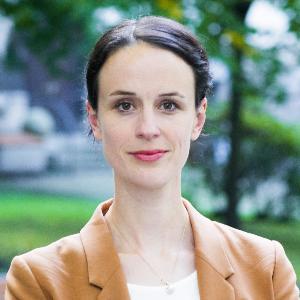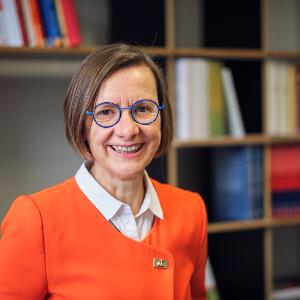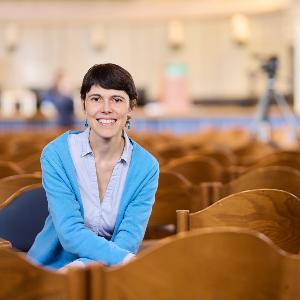Winners of Princess Therese of Bavaria Prize 2025
1 Aug 2025
This year, the Princess Therese of Bavaria Foundation has recognized outstanding female researchers from the spheres of culture and the humanities at LMU.
1 Aug 2025
This year, the Princess Therese of Bavaria Foundation has recognized outstanding female researchers from the spheres of culture and the humanities at LMU.
The Princess Therese of Bavaria Foundation is dedicated to promoting women in science at LMU. Every two years, the foundation acknowledges female scientists who have excelled in their specialist fields and serve as role models for young female researchers through their academic activities. This year, the Princess Therese of Bavaria Prize has been awarded to six outstanding female scientists from the spheres of cultural studies and the humanities at LMU.
The foundation is named after Princess Therese of Bavaria (1850-1925), who was herself a scientist, researching anthropological and zoological phenomena on her travels in Europe and America. In addition, she was a strong advocate for the education of women. She was the first woman to receive an honorary doctorate from LMU in 1897.

is Chair of Practical Philosophy and Ethics at LMU. | © Kilian Rainer
Monika Betzler studied philosophy and literature at LMU Munich and at Université Lumière Lyon 2. As a McCloy Scholar, she completed a Master of Public Administration in the Kennedy School of Government at Harvard University. She wrote her doctoral thesis on the topic of self-knowledge in classical German philosophy and contemporary subject theories. Subsequently she worked as a national expert at the European Commission’s Cellule de Prospective in Brussels and researched at the Philosophical Seminar of the University of Göttingen, at LMU’s Geschwister Scholl Institute, and at the University of California, Berkeley. In 2005, she obtained a habilitation degree in philosophy at LMU.
Betzler was made full professor of philosophy, with a focus on practical philosophy, at the University of Bern in 2006. She was a visiting professor at Paris 1 Panthéon-Sorbonne University, the University of Vienna, Lund University, and Fudan University, among other academic institutions. She is an active member of numerous scientific advisory boards and councils, including UNESCO’s International Bioethics Committee. After a year as a professorial fellow in the Murphy Institute at Tulane University in New Orleans, she was appointed to the Chair of Practical Philosophy and Ethics at LMU in 2014.
In her research, Monika Betzler explores normative ethics, moral psychology, and normativity. Her main focuses are currently on the ethics of personal relationships, the importance of personal projects, and the relationship between partiality and the demands of an impartial moral theory.
Other main areas of interest include the study of various forms of injury, the normative role of empathy, the value of autonomy, and the importance of emotions for rational and moral action. In addition, the mother of one acts as a mentor to numerous junior researchers.

is Chair of Medieval History with a focus on the Late Middle Ages at LMU. | © T. Hauzenberger
Julia Burkhardt studied medieval and modern history, political science, and Eastern European history in Heidelberg and Warsaw. In 2011, she obtained her doctorate at Heidelberg University with a dissertation on medieval imperial assemblies in Poland, Hungary, and Germany. From 2008 to 2010, she was coordinator of the German Research Foundation (DFG) Priority Programme “Integration and Disintegration of Civilisations in the European Middle Ages.” Subsequently, she worked as a research associate and then as deputy research center leader in the project “Monasteries in the High Middle Ages. Laboratories of Innovation for European Designs of Life and Models of Order” by the Heidelberg Academy of Sciences and Humanities.
In 2018, she completed her habilitation degree with an edition and analysis of the “bee book” (Bonum universale de Apibus) by Thomas of Cantimpré. The following year, she received the Manfred Fuchs Prize. After an interim professorship in Bonn, she was appointed to the Chair of Medieval History with a focus on the Late Middle Ages at LMU in 2020. Since 2023, she has been vice dean of the faculty.
Burkhardt had research residencies in Poland, the Czech Republic, the United States, and Japan. She is the co-editor of several journals and a member of numerous scientific councils, including the Constance Working Group for Medieval History, the Central Board of Directors of the Monumenta Germaniae Historica, and the Humanities and Social Sciences Class of the Academy of Sciences and Literature Mainz. Her main research interests include the history of Central Europe, cultural and gender history, political assemblies and religious communities in the High and Late Middle Ages, and text editions. Her current research project concerns femicides in the premodern era.

Professor of Modern German Literature, Cultural Theory, and Gender Studies at LMU. | © privat
Annette Keck studied modern and early German literature as well as American literary history at LMU. She also obtained her doctorate at LMU in 1995 with a dissertation on authorship and sexual relations in Alfred Döblin’s early prose. After a postdoc at the Research Training Group “Theory of Literature and Communication” in Constance, she worked as a research associate at the University of Cologne. From 2000 to 2003, she was a Lise Meitner fellow of the State of Nordrhein-Westfalen and completed her habilitation degree with the dissertation “Literal anatomies. On human reading and writing.”
In 2006, Keck was appointed Professor of Modern German Literature, Cultural Theory, and Gender Studies at LMU. In her research, she connects literary and cultural theory investigations with gender history. Among other topics, she has worked on authorship concepts, literary anthropology, figurations of innocence, humor, comedy, and the relationship between art and entertainment. Her analyses also focus on the historicity and culture-theoretical conditions of gender studies. Keck is currently exploring questions of materiality in literature and the potential of comic distortions of family life in literature and film to engender cultural reflection.
Supporting young researchers, especially female ones, is dear to Keck’s heart. For many years, she was spokesperson of the Graduate School “Language and Literature” and remains on the spokesperson team of the “Class of Literature.” In addition, she is Principal Investigator of the German Research Foundation (DFG) Research Training Group “Family Matters: Figures of Allegiance and Release.”
Since 2008, she has guided early-career researchers on the path to professorship as a mentor at the Faculty of Languages and Literatures.

Chair Professor of Religious Pedagogy at LMU. | © LMU/LC Productions
Mirjam Schambeck studied Catholic theology and German philology in Regensburg. After spells living abroad in Brazil and Bolivia, she returned to the University of Regensburg as a research assistant and subsequently junior and then senior lecturer. She completed her doctorate there in 1998 with a dissertation on dogmatics and the history of dogma and obtained her habilitation degree in 2005.
From 2006 to 2011, Schambeck was Professor of Religious Pedagogy at the University of Bamberg. In 2011 she took up the Chair of Religious Pedagogy at Ruhr University Bochum, and in 2012 she was appointed to the equivalent chair at the University of Freiburg. Since 2022, Schambeck has been Chair Professor of Religious Pedagogy at LMU. She was a visiting professor in Israel and Greece and had research residencies in Israel, India, the United States, and Canada, among other countries. Since 2015, Schambeck has been a permanent scientific advisor for (inter-)religious education to the Committee on Culture and Education of the EU Parliament. Moreover, she advises several federal German states on the organizational and content-related orientation of religion lessons.
Recently, Schambeck’s research has focused on conceptualizing antisemitism-critical education and its implementation using virtual reality. One of the aims of this work is to utilize immersive experiences and the presentation of antisemitic situations to enable schoolchildren and student teachers to recognize and counter antisemitism and treat the subject in a pedagogically responsible manner. In addition, she researches the creation of religion lessons that are fit for the future, take irreligion and non-affiliation seriously as a social reality, and empower schoolchildren to engage with religion in a responsible fashion based on reason.

Chair Professor of Philosophy and Political Theory at LMU. | © LMU/Stephan Höck
Laura Valentini obtained a degree in political science from the University of Pavia in Italy. She followed this with a master’s degree in legal and political theory and a PhD in political philosophy at University College London. Subsequently, she worked as a junior research fellow at the University of Oxford and as a postdoc in the Center for Human Values at Princeton University. Her next roles were as a lecturer in political philosophy at University College London, as associate professor in political science at the London School of Economics and Political Science, and as Professor of Philosophy, Politics and Economics at King’s College London. During this period, Valentini also had residencies at the Australian National University, the Swedish Collegium for Advanced Study, Uppsala University, Harvard University, and Goethe University Frankfurt.
In 2015, Valentini was awarded a Philip Leverhulme Prize in the category of Politics and International Relations. She has been Chair Professor of Philosophy and Political Theory at LMU since 2021. In 2023, she was elected to the Academia Europaea.
Her research is located in the domain of contemporary political, legal, and moral-philosophical theory. The main research interests of the mother of two include global justice, democracy, freedom, (human) rights, political commitments, the methodology of political theory, and the relationship between moral philosophy and social ontology. Her latest book, Morality and Socially Constructed Norms, deals with the question as to whether we have moral obligations to act in accordance with norms that exist as social facts. The spectrum here ranges from rules of social interaction and politeness to formal legal norms.

is research associate at the Institute for the Near and Middle East. | © Manu Theobald
Teresa Bernheimer studied history and political science with a focus on Hebrew at SOAS University of London. She completed her doctorate in Oriental studies with a focus on Arabic and Persian at Oxford University, before spending a research semester at Princeton University as a visiting fellow. After doing research on a postdoc scholarship in Oxford and London, she took on a lectureship and subsequently a position as senior lecturer in early Islamic history at SOAS in London from 2009 to 2017. With a research fellowship from the Gerda Henkel Foundation, Bernheimer came to LMU in 2017.
Since 2022, she has been principal investigator in the German Federal Ministry of Research, Technology and Space’s collaborative project “Beyond Conflict and Coexistence: The Entangled History of Jewish-Arab Relations.” In this context, she leads an international team of six postdoctoral fellows in Munich, Halle, and Heidelberg. Her research concentrates on the multi-confessional history of the Near and Middle East between 600 and 1200, with a particular interest in social history and material culture. Among other things, she is currently researching colors in Islam and Judaism as well as early Islamic gravestones and their routes into private and museum collections in Germany.
In addition to her research, Bernheimer promotes awareness of the multiculturalism of Islamic societies going back many centuries and thus contributes to the mitigation of social tensions. Furthermore, she advocates for a cooperative academic environment, most recently as representative of the Institute for the Near and Middle East at LMU. The mother of four is also keenly interested in supporting women in science – through mentoring and through the systematic inclusion of female researchers and gender-related topics in academic events.
Princess Therese of Bavaria Foundation: Stiftung zur Förderung von Frauen in der Wissenschaft an der LMU